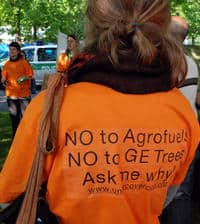Désolé, la version française de cette page ne peut être offerte pour le moment.
Blog: Convention on Biological Diversity COP9 Bonn Germany May 19-30
Also check out the daily international news at www.undercoverCOP.org
May 19, Monday
11:00 AM
The negotiations of Convention on Biological Diversity began today with a protest by La Via Campesina outside the negotiations building. “Agrofuels – no cure for oil addiction” was the banner. And the “orange block” of orange t-shirts was out calling for “No Agrofuels, No GE Trees”.
The issue of agrofuels will be a major fight her. Agrofuels has already had a direct and highly political impact on the meeting – before it even began! The orange t-shirts also say “Germany-Brazil: Stop the Deal” because Germany and Brazil have just signed a huge bi-lateral deal over biofuels. So just days before this meeting, the country hosting this meeting and the country that is bent on making sure this meeting does not discuss biofuels have already committed to biofuels policy and trade. This is a very bold pre-emption of the negotiations this week that are supposed to recommend ways to stop biofuels from destroying biodiversity.
Our Brazilian friends here say the deal with Germany involves “reforesting” parts of the amazon with eucalyptus trees! The German Minister is, according to news quotes, very excited about “second generation” agrofuels. And it is Brazil that is exploring genetically engineered eucalyptus for ethanol!
To add to this drama, Marina Silva, the Brazilian Minister of Environment resigned last week saying there is no support for environmental policies in Brazil and since COP8 was hosted in Brazil, she was the “President” of the CBD. The exchange of presidency now from Brazil and Germany is interrupted by Brazil’s drive to produce ethanol at any cost.
In his opening address, the Germany government representative stressed the need for agricultural biodiversity. He also stressed that preserving biodiversity is not a romantic idea for conservationalists but is the concern of the poor. The German youth presented their statement from their conference and not only asked for an end to the patenting of life but also for an end to all genetic engineering.
The « food crisis » and the struggle over land for biofuels has been mentioned by many so far as the major context for the meeting.
NGOs (non-governmental organizations including the Canadian Biotechnology Action Network) are united here in the understanding that the issue of agrofuels and GE trees are directly connected. And NGOs and the Indigenous people caucus are united in the demand for a ban on GE trees.
1:00
The International Indigenous Forum on Biodiversity read their statement in the plenary and talked about the threat of climate change to indigenous peoples. They urged industrialized countries to cut their greenhouse gas emissions. They stated concerned about expansion of protected areas into indigenous lands and territories and the need to reclaim lands already taken. The IIFB said that governments must encourage small farmer and indigenous food systems and called for a stoppage to biofuels as well as Terminator and genetic engineering. The statement also called governments to outlaw the patenting of knoweldge and seeds.
NGOs read a joint statement which called for ban on agrofuels and on genetically engineered trees.
2:00 Presentations on GE Trees
I am in a « side event » on GE trees presented by the Public Research and Regulation Institute which is a pro-GE collective of « public researchers, » many of whom get industry funding. According to Steve Strauss who is the leading GE tree researcher in the US – meaning that he had many field trials and spends a lot of time promoting the technology – all scientists agree that regulation is an obstacle to research in GE trees. He is wrong. Additionally, we are at the Convention on Biological Diversity where governments largely understand that regulation is needed to protect biological diversity.
The second presenter here is talking about lignin – the polymer that helps the tree stand – his slide is called « The plant cell wall: lignin is a problem » because he is talking about the need to make « bio-ethanol » from trees which lignin makes difficult and expensive. « Less lignin in trees = 50% more bio-ethanol ». « This is called ‘second generation’ biofuels. »
« Trees grow in greenhouses completely different from outside where they interact with climate etc » – this is one exact reason why field trials are so dangerous: we have no idea how GE trees will grow and interact with their environment.
« This is a green technology. This is a safe technology. How are we going to supply wood for future generations. We need to find alternatives. »
The presentation has ended with a slide that firmly place the side event as part of a lobby against the UN moratorium on GE trees that groups are asking for says:
« Conclusions
A moratorioum on field trials is against progress in science towards renewable energy.
A moratorium on GM-plants poses Nature and generations at risk. »
Tuesday May 20
CBAN joins the global campaign at a press conference: Dr. Michael Hansen, Researcher, Consumers Union; Dr. Ricarda Steinbrecher, biologist, geneticist, Director, EcoNexus, Representative, Federation of German Scientists; Lucy Sharratt, Coordinator, Canadian Biotechnology Action Network; Camila Moreno, Researcher, Terra de Direitos, Brazil; Anne Petermann, Co-Director, Global Justice Ecology Project, North American Focal Point for Global Forest Coalition and Co-coordinator of STOP GE Trees Campaign
photo: Langelle/GJEP
Noon
Word is the PM is coming to the High Level Segment next week with the Minister of the Environment…
Today the two biggest issues here will be fought out: GE trees and biofuels (agrofuels).
Yesterdays opening that included youth groups repeatedly denouncing GE from the stage, reinforced very clearly by the interventions from Indigenous peoples, Via Campesina and NGOs really seems to have rattled the Canadian delegation as this level of unqualified critique of GE is rarely heard in Canada.
Today the biofuels discussion included a dramatically different positions. For example, Tanzania stressed that land disputes and competition for water and land is a problem with biofuels and that biofuels are encouraging industrial monoculture.
Brazil defended their biofuels position and ended saying “The precautionary approach does not apply to biofuels. We are talking about agriculture and the precautionary approach should not be applied in agriculture” which was met with boos from the NGO and Indigenous peoples gallery – not a common event.
Norway understands that there is no “easy fix” to climate change. Norway also challenged the definition of ‘marginal lands’ as “Those who decide on the definitions of marginal lands are usually not those people using this land.” Brazil and many other countries talk about the future production of biofuels on marginal lands as a way to try and address competition for land. But so-called ‘marginal lands’ can include land used by pastorialists, hunters, gatherers of uncultivated foods etc. and are often home or key to the food security of many communities.
Egypt said that in relation to biofuels there is also genetically engineered organisms and this may have negative impacts on human health and environment. Egypt concluded that biofuels has become an issue of life and death.
3:00
Internet service spotty – time to hear the matter of GE trees…see our press release.
Wednesday
8:30 AM
See here, even though we did not get to make our statement yesterday there is a photo of me waiting to speak at the mic (and smiling though this is not usual in these meetings!) http://www.iisd.ca/biodiv/cop9/20may.html
Yesterday the the statements on forests including GE trees began but did not finish. The Africa Group (all African countries speaking as one group) was very clear that they still hold the position for a suspension of releases on GE trees. It was Liberia who spoke for the Group but other African countries including Ghana and Kenya spoke strongly to support the African Group position.
Many other countries mentioned concerns about GE trees or mentioned the « precautionary approach. »
We now hear from the European Commission that they will not support a moratorium on GE trees – they are partly justifying this because of the grief they took from Canada, Argentina and US over their own « de facto » moratorium on GE crops back home.
Canada, EU and New Zealand are relying on the idea that they have national regulation of GE so the issues of contamination can be managed here. But pollen and seeds from trees can travel over 1000kms…
Yesterday Ghana said, « There is so much is unknown about GM trees… In particular, gene transfer may not be seen in our lifetime. We cannot create an intergenerational problem to add to the legion of problems left to our children and grandchildren. »
2:00
All countries have now spoken on this issue – and Canada did not have anything really to say on GE trees except that they appreciated Norway’s approach (which is for a strict interpretation of the precautionary principle). We shall see tonight what this really means and if Canada has more to say as there is now a « Friends of the Chair » group to discuss all of the issues under Forest Biodiversity and there will be a new document.
Hopefully I will also be able to attend this meeting – sometimes they restrict participation from NGOs – but I did speak in the plenary to make an intervention so that will help me get inside. See here what I said on behalf of CBAN and the 46 other groups that signed the open letter.
We added that short intervention in a string of interventions from our international partners as well as Indigenous peoples – all calling for a ban on GE trees and all fitting together really well to create a strong message. Hopefully this will make a difference.
9:40 PM
We are now in a smaller group of countries to negotiate the forest issues including GE trees – we have been here for almost 3 hours already and have just moved on to page 2!! and GE trees appears on page 4…is delay a good strategy to make sure that controversial issues get negotiated at late hours? Already some delegates have had to leave the room – lets hope they are having a nice dinner and will be back in time to fight for a moratorium!
11:00 PM
Well, it looks like the delegates feel it is too early in the 2-week conference to stay past midnight – that usually happens in the last week…so we will not get to GE trees tonight. This is good in one way, as everyone would have been negotiating while being really tired but today there was momentum behind the GE trees moratorium after all of our interventions this morning.
Thursday May 22 – International Biodiversity Day – this year’s theme « Agriculture and Biodiversity »
3:00
Tonight the negotiations on forests will come back and we should get to the moratorium on GE trees. Canada is failing to support African governments in their quest to stop GE trees with a UN moratorium. Write the Minister today!!
This morning the negotiations turned to invasive species – and Zambia was very clear that GM crops are invasive species and even mentioned GM insect resistant poplar as a real concern.
Midnight
I have sent an urgent action alert and sent the CBAN press release It is clear that it will be a real fight to get a moratorium, especially as Canada is working hard to ignore the request from African governments!
Monday May 26
11:30
In a few hours we will hear again from countries that support a moratorium on GE trees and see who will oppose – the two options of moratorium and no moratorium are on the table as bracketed text, meaning that no one agrees and the issue will have to be fought out in bold terms.
On Friday the issue was not discussed but the Women’s Caucus here made a strong statement in plenary that said « No to GE Trees »
Hundreds of letters are going to the Minister of the Environment insisting that Canada support the moratorium!
5:30 Critical Negotiations – Call the Minister Now!
Now it is clear that Canada is working to stop a UN moratorium on GE trees – but our government has not succeeded yet! In fact, just now Bolivia, Cuba, St Lucia, Ecuador, Malaysia, Indonesia, Russia, Algeria spoke up to support the moratorium!
Call the Minister of the Environment, John Baird right now! (613) 996-0984
In an hour and a half countries will go into smaller group negotiations to hash it out and try to come up with a « compromise ».
Your calls and letters are making a difference and soon the Minister will be here in Germany!
7:00 PM (2:00 EST In Canada) There is still time to call the Minister and make a difference!
9:00 PM The slow pace of negotiations means we may not even get to the fight over the GE trees moratorium tonight – stay tuned – and call the Minister!
Midnight
The round of negotiations has closed just as we were about to reach the question of a moratorium on GE trees. A potentially dangerous thing will happen now – the Chair of the meeting suggested that a few government delegations on either side of the debate over the moratorium get together and come up with a solution proposal tomorrow. This means that just a few countries might bargain together and we will not hear the arguments and more countries will not be able to speak up. The real fight may be hidden from us…we shall see. The negotiations may pick up at lunch time tomorrow or again tomorrow night.
There are some pictures from today’s interventions here http://www.iisd.ca/biodiv/cop9/26may.html Liberia, on behalf of the Africa Group said, “We are very committed to the suspension of further release of GE trees.” Liberia stated the dangers of GE trees and stated that Africa has a low capacity to adapt to new innovations and this innovation is more business oriented than science oriented. “Africans do not want any further releases of GE trees.”
Tuesday May 27
10:00AM
Negotiations for GE trees are now scheduled for 7pm tonight which is 1:00 the in afternoon (EST) in Canada. So please continue to circulate the action alert and call and write the Minister.
9:00 PM
It is 3:00 EST in Canada and we are on a break from negotiations before we go back and tackle the issue of GE trees…
1:30 AM
We are not finished yet! So this is the nature of « negotiations » when there are 2 different sides and so much at stake…
Canada very clearly is implementing a number of strategies to eliminate the African request for a moratorium on GE trees – Canada has directly suggested to « delete the text » that would be the moratorium. They are supported in their strategies by New Zealand and…Colombia!
African delegates insisted on « suspend any release of GE trees » but Canada’s delaying tactics and strategies to make this disappear mean that the discussion continues tomorrow morning.
And when the negotiations on GE trees start up again I will be at the « High Level Segment » in another building with all the Ministers including our Minister of the Environment, John Baird, and the Prime Minister! More importantly, most of the African heads of delegation will be obliged to be there as well, meaning that African countries will find it challenging to be in all the separate negotiations tomorrow morning…
Our international colleagues will follow what happens in the negotiation room.
Wednesday May 28 1:30
I have just returned to negotiations on forests and GE trees is just starting!
This morning the Prime Minister spoke to the Ministers meeting and presented essentially a picture show about biodiversity in Canada without saying anything new.
Choose your option – option 1 moratorium OR option 2 status quo – these are the texts now being fought over:
Option 1: [Suspend further release of genetically modified trees until sufficient and appreciable assessment of their potential socio-economic, environmental and cultural impacts has shown that no negative impacts on forest biodiversity and on indigenous and local communities are to be expected.]
Option 2. « [Carry out scientifically sound risk assessment prior to each authorization of the release of genetically modified trees, consistent with national legislation and relevant international obligations such as the Cartagena Protocol where applicable, as well as existing regulating mechanisms and monitoring systems, to avoid negative impacts on forest biodiversity and on the livelihoods of indigenous and local communities; and support capacity building to undertake risk assessment.] »
4:00PM
The President of the meeting has just announced that if the countries cannot agree on GE trees, then he will ask some countries to come together tonight to come up with a « consensus ». How will that happen? In the meantime, Ministers are now speaking at the negotiations plenary – is Minister Baird here? I do not see him…I wonder if any Ministers will speak to the issue of GE trees.
Here is the text of Monday’s statement from the global campaign.
The Minister of the Environment from Cameroon has just said that Cameroon does not believe that GE trees should be introduced unless risk assessment as outlined in national legislation can be undertaken and that, because most African governments do not have this required legislation in place, Cameroon supports a moratorium on GE trees.
6:00
I have just confirmed that our Minister did not come here to the negotiations (and is probably now leaving Germany), though many other Environment Ministers are here this afternoon. In fact, so many are here and want to speak that we will be here for another hour! So far, Cote d’Ivoire and Uganda have now also spoken in support of the moratorium on GE trees. It is very significant that Ministers are now speaking up for a moratorium on GE trees.
We know that the Africa Group wants to see the moratorium but so far Ministers and delegations from Cameroon, Cote d’Ivoire, Uganda, Mozambique, Central African Republic and Senegal have spoken explicitly on this – with no delegations speaking against. The Syrian Arab Republic also expressed their reservations about genetically engineered organisms.
Senegal spoke about all their work to protect biodiversity and said, « We don’t want these efforts to be hampered by genetically engineered trees therefore we ask for a moratorium. »
We are now scheduled for another late night session – this time we are back to the larger group of delegations.
Check out the Press release from Europe: European Commission flies in the face of European Parliament on GE trees
10:00 PM
The negotiations are now scheduled for tomorrow…sometime. It should be in the morning. Only 2 days left to find a « compromise »
Thursday May 29
2:00
The Ministers of the Environment from Switzerland and Colombia are now chairing the small group negotiations on GE trees with a mandate to come to agreement today.
“Canada believes that suspending release would end up in having no research and we believe that research is necessary for reducing the uncertainties relating to assessing the risks of GE trees and would have a serious impact on innovation and progress.”
Friday May 30
Well the negotiations appear to now finally over – and the outcome is not a moratorium on GE trees.
Brazil and Colombia maneuvered successfully to stop the moratorium – and Canada was happy to let them take the lead. Canada also (as could be seen very plainly) worked with Brazil and Colombia and with New Zealand and Australia to keep the moratorium from happening.
The meeting did recognize the serious risks of GE trees and recognized that national moratoria are legitimate actions for countries to take to protect against these risks.
African countries spoke really strongly. The Indigenous peoples organizations are really strong here and civil society groups also. The Canadian delegation was very aware that the Minister was receiving hundreds of letters in Canada also.
The international mobilization that has taken place leading up to here and during these past two weeks has been incredible and is tied strongly to a movement for protection of biodiversity against plantations, including plantations for agrofuels.







